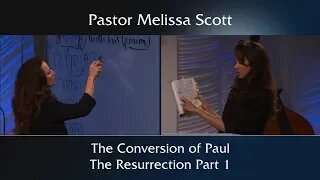Premium Only Content

Saul of Tarsus / the Apostle Paul's Conversion in Acts: Are Acts 9:7, 22:9 & 26:14 contradictory?
Luke records the conversion of Saul of Tarsus, who became the Apostle Paul, three times in the book of Acts--chapters 9, 22, and 26. Skeptics and non-Christians, such as the Islamic apologist Shabir Ally in his debate with Thomas Ross, have claimed that these records of Paul's conversion are contradictory. The most commonly cited contradiction among these passages, and the one cited by Dr. Ally, was between Acts 9:7 and Acts 22:9:
"And the men which journeyed with him stood speechless, hearing a voice, but seeing no man." (Acts 9:7)
"And they that were with me saw indeed the light, and were afraid; but they heard not the voice of him that spake to me." (Acts 22:9)
Atheists, agnostics, Muslims, and many others who deny the Bible is God's Word argue that in Acts 9 Luke states that Paul's companions heard the voice of the risen Savior, Jesus Christ, while in Acts 22:9 Paul's companions are said not to have heard the voice of the resurrected Son of God.
However, Christians have pointed out that the burden of proof for a genuine contradiction among Acts 9, 22, and 26 is not met. It is impossible to prove that these texts are asserting that the same proposition is both true and false in the same sense and at the same time. A comparison of the three accounts of Paul's conversion in Acts 9, 22, and 26 make it highly likely that the passages teach that Paul’s companions heard a sound, but did not understand the voice of the risen Christ speaking in Hebrew to the Apostle Paul.
The Greek word translated "hear" is employed both of the mere recognition of sounds and of understanding what is said. The Greek word rendered "voice" is used in the New Testament both of simple sounds that are not understood and of actual language. The change in Greek constructions between Acts 9:7, where the verb akouo (“hear/understand”) takes the Greek word phone (“voice/sound”) in the genitive case, and Acts 22:9, where the Greek word phone is in the accusative case, not the genitive, support a distinction. The verb theoreo in Acts 9:7 can also indicate not only “to observe something” but also “to come to the understanding of something, notice, perceive, observe, find.” It is translated as “perceive” within Acts twice (Acts 17:22; 27:10). Thus, Acts 9:7 indicates that Paul’s companions heard a sound, but did not “perceive” or “come to the understanding” of what was said by the risen Christ.
While such linguistic differences are highly likely to be the explanation for the only apparent contradiction between Acts 9:7 and Acts 22:9 (cf. Acts 26:14), there are numbers of other perfectly reasonable explanations that invalidate the alleged proof of contradiction. For example, Acts 22:7, 9; 26:14 employ Greek verb tenses employed for continuing action in relation to Paul’s hearing the voice “saying” or “speaking” to him, while Paul’s companions “heard/understood not” (Acts 22:9), employing the Greek tense for a point action. The text is consistent with the possibility that Paul continued to hear what Christ said in a complete message to him (Acts 22:7, 9; 26:14; continuing action) while Paul’s companions only heard the voice/sound for a moment but did not hear the entire message (Acts 22:9; point action).
Dr. Dan Wallace, author of the acclaimed Greek Grammar beyond the Basics: An Exegetical Syntax of the New Testament, points out:
It is ... most reasonable to conclude that these accounts are not presenting contradictory views about what Paul’s companions heard. The most probable solution sees the various traditions that Luke gathered (including Acts 26:14) as from different sources. Luke then compiled the information in a conservative manner, even to the point of preserving much of the wording of his sources where both akouo and phone carried different nuances in each source). Hence, what looks like a contradiction is in reality evidence of Luke’s reticence to drastically alter the traditions ... handed down to him (pg. 134).
Craig Keener, in his monumental Acts: An Exegetical Commentary, vol. 1 (1:1–14:28) vol. 1, writes:
Yet another possible solution may also rise from the genre of Acts as ancient rather than modern historiography. Ancient historians fleshing out minor details of a simpler account might flesh it out differently on different occasions. Such variation could also function as a deliberate rhetorical device[.] . . . The difference . . . is certainly less than many differences between accounts of the same events in Josephus’s War and his Antiquities of the Jews. That Josephus composed differently even in such elite works, each potentially read by the same audience as the other, suggests that ancient audiences normally saw little problem with, and probably often expected, such rhetorical variation. This proposed solution ... it certainly falls within what was allowed in ancient historical writing. (pgs. 1639–1640)
For more information, see:
https://faithsaves.net/Shabir-Ally-debate/
https://faithsaves.net/Gods-Word/
-
 0:45
0:45
erichartmann
4 years agoApostle Paul's Prison cell video
81 -
 30:04
30:04
addedSOULS
4 years agoADDEDSOULS e.001 - Paul's Conversion
696 -
 1:13:24
1:13:24
Pastor Melissa Scott, Ph.D.
3 years agoActs 9 The Conversion of Paul: The Resurrection Part 1
82 -
 3:27
3:27
Whisperingpinesstudio
3 years agoPaul's gospel
973 -
 57:16
57:16
Church
3 years agoPaul's Example
761 -
 0:16
0:16
HusseyFamily
3 years agoPaul's birthday
52 -
 12:36
12:36
HOPEmciBUS
3 years agoBus conversion
38 -
 1:08:09
1:08:09
Robertbreaker
3 years ago $0.06 earnedPaul's Ministry
332 -
 0:52
0:52
AfricanNewsAgency
3 years agoINDIA GAY CONVERSION THERAPY
562 -
 1:39:22
1:39:22
Melonie Mac
3 hours agoGo Boom Live Ep 30!
30.2K5